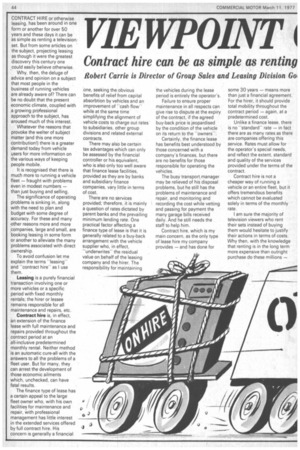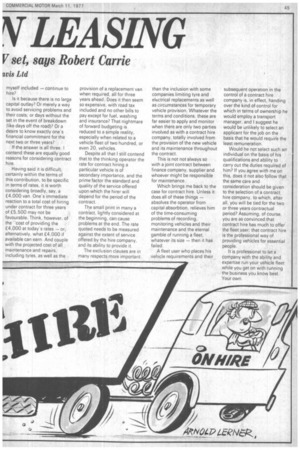VIEWPOINT V LEASING
Page 48

Page 49

If you've noticed an error in this article please click here to report it so we can fix it.
CONTRACT HIRE or otherwise leasing, has been around in one form or another for over 50 years and these days it can be as simple as renting a television. set. But from some articles on the subject, projecting leasing as though it were the greatest discovery this century one _could easily believe otherwise.
Why, then, the deluge of advice and opinion on a subject that most people in the business of running vehicles are already aware of? There can be no doubt that the present economic climate, coupled with a growing professional approach to the subject, has aroused much of this interest.
Whatever the reasons that provoke the welter of subject matter (and this one more contribution!) there is a greater demand today from vehicle users for more information on the various ways of keeping people mobile.
It is recognised that there is much more to running a vehicle fleet — fraught with problems even in modest numbers — than just buying and selling.
The significance of operating problems is sinking in, along with the need to plan and budget with some degree of accuracy. For these and many other reasons more and more .companies, large and small, are booking leasing in some form or another to alleviate the many problems associated with direct ownership.
To avoid confusion let me explain the terms "leasing" and -contract hireas I use
them. • Leasing is a purely financial transaction involving one or more vehicles or a specific period with fixed monthly rentals; the hirer or lessee remains responsible for all maintenance and repairs, etc.
Contract hire is, in effect, an extension of the finance lease with full maintenance and repairs provided throughout the contract period at an all-inclusive predetermined monthly rental. Neither method is an automatic cure-all with the answers to all the problems of a fleet user. But for many, they can arrest the development of those economic ailments which, unchecked, can have fatal results.
The finance type of lease has a certain appeal to the large fleet owner who, with his own facilities for maintenance and repair, with professional management has little interest in the extended services offered by full contract hire. His concern is generally a financial one, seeking the obvious benefits of relief from capital absorbtion by vehicles and an improvement of "cash flow" while at the same time simplifying the alignment of vehicle costs to charge out rates to subsidiaries, other group divisions and related external contracts.
There may also be certain tax advantages which can only be assessed by the financial controller or his equivalent, who is also only too well aware that finance lease facilities, provided as they are by banks and subsidiary finance companies, vary little in terms of cost.
There are no services provided; therefore, it is mainly a question of rates dictated by parent banks and the prevailing minimum lending rate. One practical factor affecting a finance type of lease is that it is generally related to a buy-back arrangement with the vehicle supplier who, in effect, -underwritesthe residual value on behalf of the leasing company and the hirer. The responsibility for maintaining
the vehicles during the lease period is entirely the operator's.
Failure to ensure proper maintenance in all respects can give rise to dispute at the expiry of the contract, if the agreed buy-back price is jeopardised by the condition of the vehicle on its return to the -owners".
Certainly, the finance lease has benefits best understood by those concerned with a company's finances, but there are no benefits for those responsible for operating the vehicles.
The busy transport manager may be relieved of his disposal problems, but he still has the problems of maintenance and repair, and monitoring and recording the cost while vetting and passing for payment the many garage bills received daily. And he still needs the staff to help him.
Contract hire, which is my main concern, as the only type of lease hire my company provides — and has done for some 30 years — means more than just a financial agreement. For the hirer, it should provide total mobility throughout the contract period — again, at a predetermined cost.
Unlike a finance lease, there is no "standard'' rate — in fact there are as many rates as there are companies offering this service. Rates must allow for the operator's special needs, and reflect the extent, standard and quality of the services provided under the terms of the contract.
Contract hire is not a cheaper way of running a vehicle or an entire fleet, but it offers tremendous benefits which cannot be evaluated solely in terms of the monthly rate.
I am sure the majority of television viewers who rent their sets instead of buying them would hesitate to justify their actions in terms of costs. Why then, with the knowledge that renting is in the long term more expensive than outright purchase do these millions — myself included — continue to hire?
Is it because there is no large capital outlay? Or merely a way to avoid servicing problems and their costs; or days without the set in the event of breakdown ;like days off the road)? Or a desire to know exactly one's financial commitment for the next two or three years?
If-the answer is all three. I contend these are equally good reasons for considering contract hire.
Having said it is difficult, certainly within the terms of this contribution, to be specific in terms of rates, it is worth considering broadly, say, a £4,000 van. One's immediate reaction to a total cost of hiring under contract for three years of £5,500 may not be favourable. Think, however, of the -cost of providing the
(4,000 at today's rates or, alternatively, what £4,000 if available can earn. And couple with the projected cost of all maintenance and repairs, including tyres. as well as the provision of a replacement van when required, all for three years ahead. Does it then seem so expensive, with road tax included and no other bills to pay except for fuel, washing and insurance? That nightmare of forward budgeting is reduced to a simple reality, especially when related to a vehicle fleet of two hundred, or even 20, vehicles.
Despite all that I still contend that to the thinking operator the rate for contract hiring a particular vehicle is of secondary importance, and the prime factor the standard and quality of the service offered upon•which the hirer will depend for the period of the contract.
The small print in many a contract, lightly considered at the beginning, can cause problems at the end. The rate quoted needs to be measured against the extent of service offered by the hire company, and its ability to provide it.
The exclusion clauses are in many respects more important than the inclusion with some companies limiting tyre and electrical replacements as well as circumstances for temporary vehicle provision. Whatever the terms and conditions, these are far easier to apply and monitor when there are only two parties involved as with a contract hire company, totally involved from the provision of the new vehicle and its maintenance throughout the contract.
This is not not always so with a joint contract between finance company, supplier and whoever might be responsible for maintenance.
Which brings me back to the case for contract hire. Unless it does all of these things — absolves the operator from capital absorbtion, relieves him of the time-consuming problems of recording, monitoring vehicles and their maintenance and the eternal gamble of running a fleet, whatever its size — then it has failed.
A fleet user who places his vehicle requirements and their subsequent operation in the control of a contract hire company is, in effect, handing over the kind of control for which in terms of ownership he would employ a transport manager, and I suggest he would be unlikely to select an applicant for the job on the basis that he would require the least remuneration.
Would he not select such an individual on the basis of his qualifications and ability to carry out the duties required of him? If you agree with me on this, does it not also follow that the same care and consideration should be given to the selection of a contract hire company: to which, after all, you will be tied for the two or three years contractual period? Assuming, of course, you are as convinced that contract hire has much to offer the fleet user; that contract hire is the professional way of providing vehicles for essential people.
It is professional to let a company with the ability and expertise run your vehicle fleet while you get on with running the business you know best. Your own.






















































































































